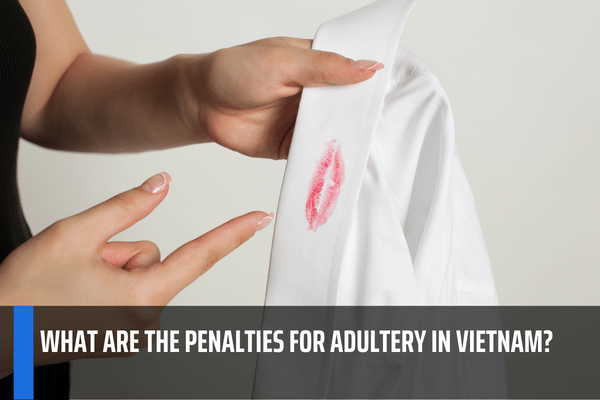Vietnam: Will an adulterer face a penalty of imprisonment? What are the prohibited acts to protect the marriage and family regime?
What is adultery? How to determine the act of adultery in Vietnam?
According to the provisions of the Law on Marriage and Family 2014, the form of monogamy is legal, husband and wife have the obligation to be faithful to each other. However, there are still some sneaky relationships known as adultery.
Adultery is a term used to refer to a married person engaging in sexual acts with someone other than their legal spouse.
Adultery is considered a violation of the fidelity obligations.
Pursuant to Point c, Clause 2, Article 5 of the Law on Marriage and Family 2014 stipulates that a married person getting married to or cohabitating as husband and wife with another person, or an unmarried person getting married to or cohabitating as husband and wife with a married person is one of the prohibited acts to protect the marriage and family regime.
Currently, it is very difficult to prove adultery to determine that the other party has violated the monogamy.
The behavior must be clearly demonstrated such as having children together or being considered by neighbors and the surrounding society as husband and wife, having common property, being educated by families, agencies or organizations and still continuing to maintain the relationship. This extramarital relationship outside of husband and wife is considered adultery and violates monogamy.

Vietnam: Will an adulterer face a penalty of imprisonment? What are the prohibited acts to protect the marriage and family regime? (Image from the internet)
Will an adulterer face a penalty of imprisonment in Vietnam?
Pursuant to Article 182 of the Criminal Code 2015 stipulates that the crime of violating the monogamy regime shall be examined for penal liability as follows:
- Any married person who marries or cohabits with another person, any unmarried person who marries or cohabits with another person in the knowledge that he/she is already married and in any of the following circumstances shall receive a warning or face a penalty of up to 01 year's community sentence or 03 - 12 months' imprisonment:
+ The offence results in the divorce of one or both parties;
+ The offender has incurred an administrative penalty for the same offence.
- This offence committed in any of the following circumstances carries a penalty of 06 - 36 months imprisonment:
+ The offence results in the suicide of the spouse or child of either party;
+ The court has issued a decision on dissolution of the marriage or compulsory termination of the cohabitation but the offender still defies such decision.
Pursuant to Clause 1, Article 59 of Decree 82/2020/ND-CP stipulating penalties for violations against regulations on marriage and divorce and violations of the monogamous marriage regime as follows:
- A fine of between VND 3,000,000 and 5,000,000 shall be imposed for one of the following acts:
+ A married person gets married to another person, or an unmarried person get married to a married person;;
+ A married person cohabitates as husband and wife with another person;
+ An unmarried person cohabitates as husband and wife with a married person;
+ Get married or cohabitate as husband and wife between adoptive parent and adopted child; or former adoptive parent and adopted child, father-in-law and daughter-in-law, mother-in-law and son-in-law, or stepparent and stepchild;
+ Force a person into marriage, demand property in marriage.
Therefore, those who commit adultery and commit acts of violation of the monogamy regime satisfying the above conditions will be prosecuted for penal liability with the highest prison term from 6 months to 3 years and lighter than fines. administrative fees from 3,000,000 to 5,000,000 VND.
What are the prohibited acts to protect the marriage and family regime in Vietnam?
Pursuant to Clause 2, Article 5 of the Law on Marriage and Family 2014, the following acts are prohibited:
- Sham marriage or sham divorce;
- Underage marriage, forcing a person into marriage, deceiving a person into marriage, obstructing marriage;
- A married person getting married to or cohabitating as husband and wife with another person, or an unmarried person getting married to or cohabitating as husband and wife with a married person;
- Getting married or cohabitating as husband and wife between people of the same direct blood line; relatives within three generations; adoptive parent and adopted child; or former adoptive parent and adopted child, father-in-law and daughter-in-law, mother-in-law and son-in-law, or stepparent and stepchild;
- Demanding property in marriage;
- Forcing a person into divorce; deceiving a person into divorce; obstructing divorce;
- Giving birth with assisted reproductive technology for commercial purpose, commercial gestational surrogacy, prenatal sex selection, cloning;
- Domestic violence;
- Taking advantage of marriage and family rights for human trafficking, labor exploitation or sexual abuse or committing another act for self-seeking purposes.
LawNet
